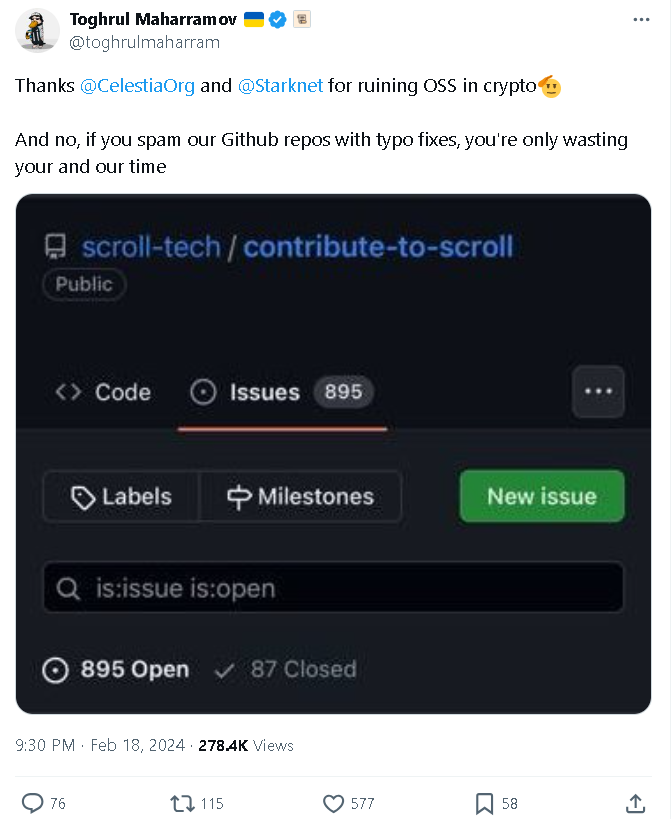"On February 18th, Scroll's senior researcher Toghrul Maharramov expressed on social media that 'sending spam emails to GitHub repositories and fixing spelling errors is just a waste of your own and our time.' In this tweet, Toghrul Maharramov specifically mentioned Celestia and Starknet, 'accusing' them of disrupting encrypted OSS.

Scroll GitHub Filled with Spam Emails
Toghrul Maharramov's 'dissatisfaction' with Celestia and Starknet stems from their expansion of airdrops to developers and contributors.
According to Starknet's latest airdrop standards, developer Tom Kysar received 1,800 Starknet tokens for making a single commit on Starknet's GitHub, which was simply a spell check in the Starknet documentation. Prior to the Starknet token transaction, the value of this airdrop amounted to $3,200.
Kysar's success has spawned some imitators who have flocked to non-token project repositories on GitHub in hopes of future airdrops, with Scroll being the prime target of this imitation frenzy.
Recently, short sellers have been sending low-quality contributions in the form of spam emails to Scroll's GitHub repository, causing the team to spend a significant amount of time filtering out the spam. A Scroll developer stated that the 'core team is struggling,' and this issue may 'make their lives even more difficult.'
Although Toghrul Maharramov stated that this is not currently a major issue, the content of spam email submissions continues to increase. According to DLNews, there are now over 1,100 issues, with 300 new issues added in the past 24 hours. Despite the ongoing influx of spam emails, Toghrul Maharramov stated that the team has the situation under control, and 'filtering out all the spam emails should take a few hours.'
In fact, Tom Kysar's word modification on Starknet cannot be equated with spam emails, and rewarding OSS contributors by Celestia and Starknet is not a bad thing. As Toghrul Maharramov intended to convey, 'even the noblest cause in the crypto field, rewarding open-source software contributors, may lead to some improper incentives, and some people may choose to take advantage of these incentives.'
Attacking GitHub, New Tricks of the Trade
Airdrops are intended to reward early users of DeFi protocols and transform the initial batch of project fans into a guiding group for the project's next steps. For example, these tokens are typically used to propose project changes. Toghrul Maharramov also stated that 'the goal of airdrops should be to distribute your tokens to as many users related to your project as possible.'

Due to a small number of airdrop recipients receiving bonuses worth tens of thousands of dollars, the appeal of cryptocurrency airdrops has become increasingly significant, and this has become a major issue for crypto projects.
In order to maximize their potential airdrop rewards, 'farmers' will create multiple wallet addresses, invest hundreds of hours, and deploy complex strategies to conceal their farming activities. As long as they are not caught, they can earn millions of dollars in free tokens. In June of last year, a team in Shenzhen held a Zksync offline event, with over a hundred people collectively holding hundreds of thousands of addresses, and this number continues to grow.
Under the incentives of OP and ARB farming, a large number of people and funds have poured into the farming industry, frantically searching for new unreleased public chains and L2 solutions, with L2 being the absolute mainstay of interaction. Hundreds of thousands, or even millions, of addresses have been generated, and a massive amount of ETH has been used for 'meaningless' interactions.
For project teams, knowing that most of these addresses are just for farming and will run away after farming, they will also find ways to counteract this behavior. In the battle for L2 supremacy, a large portion of gas fees in L2 transactions on the market go to transaction fees, which flow into the project team's pockets. In addition, multi-chain farming has made 'cross-chain bridges' a necessity, especially for Orbiter Finance, which focuses on low-fee cross-chain L2 solutions and has become the biggest winner by collecting 'bridge fees,' earning over a million dollars per month, with over 90% contributed by farmers.
In this game, L2 earns fees hand over fist, and farming has shifted from 'low-cost high returns' to 'high-cost low returns,' and even 'high-cost negative returns.' Many farmers have not reaped the benefits they expected and have been counter-farmed. Many people on Twitter have exclaimed that 'the farming studio is about to face a wave of closures.'
In the face of an increasingly convoluted industry, studios have had to find new breakthroughs in farming. Celestia and Starknet's new airdrop rules and Kysar's potential thousand-dollar airdrop temptation undoubtedly point the way for farmers to shift from unreleased public chains and Layer2 solutions to unreleased projects on GitHub.
A large number of farmers have followed Kysar's tactics, sending low-quality contributions in the form of spam emails to Scroll's GitHub repository, and then fixing the spelling errors themselves in hopes of receiving potential airdrops from Scroll.
The spam email harassment suffered by Scroll's code repository is akin to a witch attack. In March of last year, Arbitrum's $1 billion airdrop still suffered from thousands of witch attackers bypassing preventive measures and siphoning off millions of dollars in losses.
Although various projects have begun deploying so-called 'witch hunters' to detect and filter attackers in the face of witch threats in airdrops, it is becoming increasingly difficult to effectively exclude attackers in the DeFi industry while ensuring that users remain anonymous and only receive airdrops once. After all, most projects do not want to take the risk of excluding actual users and causing a public relations storm like ParaSwap.
Although deceptive airdrops are seen as a fair game by some in the free-spirited cryptocurrency world, and some DeFi professionals acknowledge the cunning of witch attackers, Toghrul Maharramov also hinted that attacking Scroll's repository will not result in receiving airdrops."
免责声明:本文章仅代表作者个人观点,不代表本平台的立场和观点。本文章仅供信息分享,不构成对任何人的任何投资建议。用户与作者之间的任何争议,与本平台无关。如网页中刊载的文章或图片涉及侵权,请提供相关的权利证明和身份证明发送邮件到support@aicoin.com,本平台相关工作人员将会进行核查。




